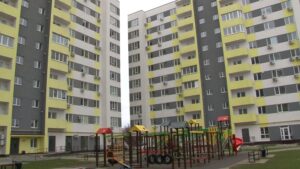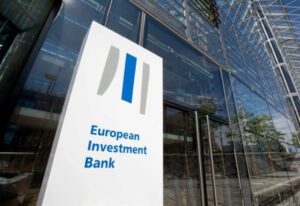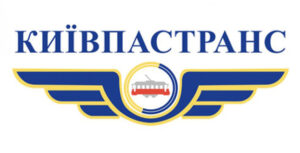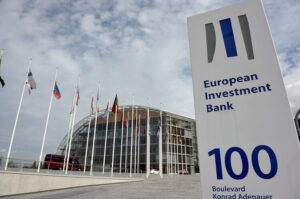
The European Investment Bank (EIB) is considering providing EUR 400 million in financing for a pilot project to build social housing in Ukraine, the press service of the Institute for Economic Research and Policy Consulting (IER) reports.
“Negotiations are currently underway to provide EUR 400 million in funding, which will consist of a grant and a loan for the construction of public housing. This should be housing in normally built-up parts of the city, with access to technical and social infrastructure,” said Grzegorz Gajda, Senior Sector Economist at the EIB, as quoted in the press release.
He noted that the housing should be built using the best European practices, in accordance with energy-efficient standards and the principle of build-back-better.
The project envisages the construction of about 6-6.5 thousand apartments. The EIB will select areas for social housing construction based on the needs of the regions and their interest in cooperation.
Along with this, the conditions for renting housing are being discussed. In particular, it is proposed to allocate social housing to employed Ukrainians with a salary not lower than the average, as well as to give local authorities the opportunity to transfer 20-30% of apartments for rent to people selected according to their own criteria, taking into account the professionals needed in the region.
According to the expert, the project also envisages finding opportunities for the social housing sector to independently finance its operations and maintenance to avoid the need for state funding for housing maintenance.
As the IER points out, at the beginning of 2022, there were only 3 thousand social apartments in Ukraine, while the number of internally displaced persons (IDPs) at the end of the year amounted to more than 5 million people. According to the International Organization for Migration, there are about 3.6 million internally displaced persons in Ukraine as of October 2024.

The European Investment Bank (EIB) Group is planning new loans totaling EUR450 million for Ukrainian energy investments, including the reconstruction of hydroelectric power plants and power grid infrastructure damaged by Russian attacks, as well as the restoration of district heating networks in Ukrainian cities.
According to a press release on the bank’s website, another EUR 86 million will go to Ukraine’s national power grid operator, NPC Ukrenergo, to build drone shelters for power plants.
“We are stepping up our support to help protect and repair Ukraine’s infrastructure before winter,” the release quotes EIB President Nadezhda Calvigno as saying, “On July 22, she briefed EU foreign ministers on these measures and held a regular video conference with Ukrainian Finance Minister Sergii Marchenko to discuss progress on ongoing projects, especially in energy infrastructure.
According to her, the bank will also expand its support for Ukraine’s economy by facilitating access to finance for businesses and promoting trade with the EU.
In the business finance component of the latest support package, the EIB Group approved three partial portfolio guarantees, which are expected to lead to more than EUR 110 million in new lending to Ukrainian micro, small and medium-sized enterprises through three Ukrainian banks. It is specified that the guarantees are to be signed in the second half of 2024 with the respective banks and will support 550 Ukrainian companies, preserving about 8,250 jobs.
In addition, the EIB Group intends to provide partial portfolio guarantees to five more banks in Ukraine by the end of the year under the EU4Business Guarantee Facility, the release said.
According to the release, this week the EIB is also joining forces with Ukrsibbank, the Ukrainian subsidiary of BNP Paribas Group and one of Ukraine’s largest banks, to launch a revolving credit line of at least EUR150 million in Ukrainian hryvnia to support businesses affected by the war. The local currency facility is expected to be operational by the end of 2024. This is the EIB’s second initiative to stimulate local currency lending in Ukraine, following a partnership with Citibank Ukraine for between $50 million and $100 million in Ukrainian hryvnia.
In addition, the release notes, by the end of this month and following the signing of an agreement with the European Commission in June, the European Investment Fund (EIF) will start accepting applications under a EUR300 million export credit guarantee facility to support EU companies trading with Ukraine. The initiative will offer guarantees to export credit agencies in EU member states, as well as Norway and Iceland, that want to help export to Ukraine.
Following a videoconference on July 22, the Ministry of Finance of Ukraine announced that it expects the EIB to approve a EUR250 million package of support for Ukraine’s energy sector in the near future.
In general, according to the Ukrainian side, the volume of EIB initiatives in the public sector is 26 projects worth EUR 5.3 billion, and the volume of the portfolio of joint projects in the public and private sectors is the largest for all years of cooperation and exceeds EUR 7 billion, including about EUR 2 billion of EIB investments in all areas since the beginning of the full-scale war.
Regarding current initiatives, the parties also discussed preparations for the signing of a financial agreement between Ukraine and the EIB on the project “Implementation of the Emergency Assistance System for the Population by a Single Number 112”, as well as potential joint projects, in particular, aimed at providing housing for Ukrainian citizens.
As reported, in 2024, Ukraine and the EIB signed a Memorandum of Understanding on cooperation in the public and private sectors of Ukraine’s economy. The Memorandum identifies priority areas of cooperation for the next 10 years.

Kyivpastrans, as part of the implementation of the European Investment Bank-financed program “Urban Public Transport of Ukraine”, has announced a new tender for the purchase of 12m and 18m trolleybuses for a total amount of up to EUR50m.
According to the announcement published in the Official Journal of the EU, to which the AllTransUA portal refers, it is planned to purchase low-floor trolleybuses, as well as the necessary spare parts, tools and equipment.
Disclosure of the bids is scheduled for July 31. The first batch of trolleybuses should be delivered in 24 weeks after the receipt of the advance payment by the supplier, and the entire contract is designed for 78 weeks.
As reported, under this loan agreement with the EIB, Kiev has already tried twice to purchase trolleybuses – the tender announced in November 2022 failed, and the one announced in August 2023, with bids submitted by the Czech Republic’s Škoda and Turkey’s Bozankay, was recently finally canceled, according to AllTransUA.
“Unfortunately, just like last time, single and two-section trolleybuses are to be delivered within one lot, and the quantity ratio is not specified in the announcement. This creates exactly the same problems as last time, when Ukrainian manufacturers could not participate, and foreign manufacturers offered a purely formal number of two-section trolleybuses (1 and 3 pcs.),” – notes AllTransUA.
As reported, the EIB and Kyiv Mayor Vitaliy Klitschko on December 10, 2021 signed a loan agreement for EUR100 million for the project of renewal of the trolleybus fleet, as well as the car fleet of the capital’s metro. This was the first loan from the EIB in Ukraine offered directly to the city without state guarantees.

The European Investment Bank (EIB), in cooperation with the European Commission (EC), is ready to assist in launching social housing programs, Oksana Remiga, EIB Senior Lending Specialist, said in an interview with Interfax-Ukraine.
The Ministry of Infrastructure and Regional Development is currently engaged in housing policy reform, which aims to harmonize Ukrainian practices with the best European ones. One of the points that is only touched upon in the draft law, but is necessary to harmonize the overall framework, is social and affordable housing; a separate law will be developed in the future.
“The EIB, in cooperation with the European Commission, has pledged to provide assistance to launch this area. We are discussing the possibility of a EUR 200 million targeted loan, which will be supported by a significant investment grant from the EC. Plus a technical assistance package of EUR12 million, which can be used not only to develop technical solutions, implement and monitor them, but also to help develop the regulatory framework,” Remiga said.
She clarified that an active discussion is currently underway between the experts who participated in the development, technical assistance groups, and the future form of this sector.
“Together with the European Commission, we are trying to promote the model that was used in Europe after the Second World War to solve the problem of housing,” she said.
According to her, the model of social housing implies, among other things, that the facilities should be fully owned by the municipality, this sector should be self-sustaining and financially stable.
“What mechanisms can ensure this (financial stability)? One of the simplest ones used in European countries is that in a building under construction, 80% of the premises are allocated for social housing, which is rented by certain socially vulnerable groups at a reduced rent. This housing cannot be bought out. As for the rest of the premises – housing, commercial – it is rented at market rent, which allows to ensure the functioning of the facility,” explained Remiga.
Since it is more difficult to generate income from commercial space in small towns than in large cities, it may be more appropriate for smaller municipalities to establish joint regional offices.
Another key principle of social housing policy is to avoid ghettoization.
“The buildings of such a housing stock should not be located compactly, the buildings should harmoniously fit into the overall urban landscape. It is also important to provide social infrastructure and good transport links,” said Remiga.
At the same time, she noted that the EIB does not consider participation in affordable housing programs, social lease with purchase.
“We are considering programs aimed at creating and improving the quality of social housing packages in municipalities. However, I would like to emphasize that in general, the EIB does not offer programs whose ultimate goal is to provide loans to individuals for housing. Only the creation of housing owned and managed by municipalities,” said Remiga.
The start of the social housing program can be expected no earlier than mid-autumn 2024.
“The European Union and the EIB, which is the bank of the European Union, have a rule: legislative structural changes first. However, due to the extremely critical situation in Ukraine, we are ready to work in parallel. Since we are already working on the regulatory framework, this allows us to launch administrative procedures on our part in parallel. As soon as the (framework) parameters of the future legislation are clear, even before it is adopted and implemented, we can start working on projects,” Remiga summarized.
She added that the upcoming loan program for social housing with a budget of EUR 200 million is a pilot program.
“Given the needs of Ukraine, billions are really needed to solve housing issues. Only after the pilot project is launched and established, when we can see its effectiveness and the ability of municipalities to manage this pool of real estate, can we talk about launching the next stages. We are very interested in this,” said Remiga.

The European Investment Bank (EIB) has allocated EUR 3 million to improve the energy efficiency of 18 public buildings in Zaporizhzhia, Kamianske and Lutsk.
“The allocated funds will be used to modernize five kindergartens and three schools in Zaporizhzhia, four kindergartens and three schools in Kamianske, and in Lutsk to modernize three hospitals intended for the treatment of civilians and rehabilitation of military personnel injured during the war,” the EU Delegation to Ukraine reported on its website on Thursday.
It is noted that these funds will help the Ukrainian authorities to continue implementing the EIB’s Municipal Infrastructure Development Program (MIP), which aims to improve public infrastructure in various municipalities.
“After today’s tranche of EUR 3 million, the total amount of funds allocated for the UMIP in 2023 will amount to EUR 11.74 million,” the release states.
It clarified that EUR8.74 million of these funds were previously used to support key municipal projects such as the reclamation of the Hrybovychi landfill and solid waste management in Lviv, the implementation of energy efficiency measures in kindergartens in Sumy, and the improvement of water supply and sewage systems in Lutsk.
According to EIB Vice President Teresa Czerwinska, responsible for the bank’s operations in Ukraine, energy efficiency measures should be prioritized during Ukraine’s current and future large-scale recovery, as they play an important role in strengthening the country’s energy security and independence.
“The EIB is fully committed to supporting the Ukrainian government and cities in these efforts by transferring best practices in reconstruction and modernization to rebuild the Ukrainian economy, reduce energy costs and improve energy efficiency in all sectors,” she assured.
In addition, it is indicated that UMIP is a EUR 400 million multi-sectoral investment initiative aimed at supporting public infrastructure projects in medium and large municipalities. UMIP’s objectives include investments in district heating rehabilitation, energy efficiency improvements in buildings, modernization of street lighting, and water, sewerage and solid waste management, among others. The program is implemented by the Ministry of Communities, Territories and Infrastructure Development in cooperation with the Ministry of Finance of Ukraine. The UMIP is complemented by technical assistance provided through the Eastern Partnership Technical Assistance Trust Fund (EPTATF), managed by the EIB, and the Neighborhood Investment Platform (NIP).
The release specifies that the EIB’s support to Ukraine since the beginning of Russia’s full-scale invasion of Ukraine has reached EUR 1.7 billion in financing for urgent repairs to destroyed infrastructure. The EU bank has also provided a EUR4 billion credit line to support the integration of refugees from Ukraine in EU countries.

The European Investment Bank (EIB) will allocate EUR 450 million to Ukraine for two recovery projects, with the first two tranches of EUR 100 million each to be approved by the end of 2023, the press service of the Ministry of Recovery reports.
The funds, with a total budget of EUR450 million, are reportedly allocated to two projects – Ukraine Recovery III FL and Ukraine Water Recovery FL.
Ukraine Recovery III FL (EUR250 million, first tranche – EUR100 million): aims to finance critical social and urban infrastructure. This includes the restoration of infrastructure damaged as a result of Russian aggression and the construction of new basic infrastructure to ensure decent living conditions for displaced persons and host communities;
Ukraine Water Recovery FL (EUR 200 million, first tranche – EUR 100 million): aims to finance investments in critical water infrastructure in areas directly affected by the war or where a significant number of IDPs live. This includes the restoration of water supply and sewerage, including measures to overcome the consequences of the destruction of the Kakhovka dam.
Funds from the European Investment Bank (EIB) are allocated as part of cooperation with Ukraine, the principles of which are laid down in the Memorandum of Understanding signed on June 21, 2023 in London at the URC 2023 conference. The Memorandum provides for the allocation of a total of about EUR 840 million in loans for the implementation of infrastructure rehabilitation projects in Ukraine.
Subject to final approval by the EIB Board of Directors and the EU4U Donor Committee, the first tranches of EUR 100 million will be signed by the end of this year.